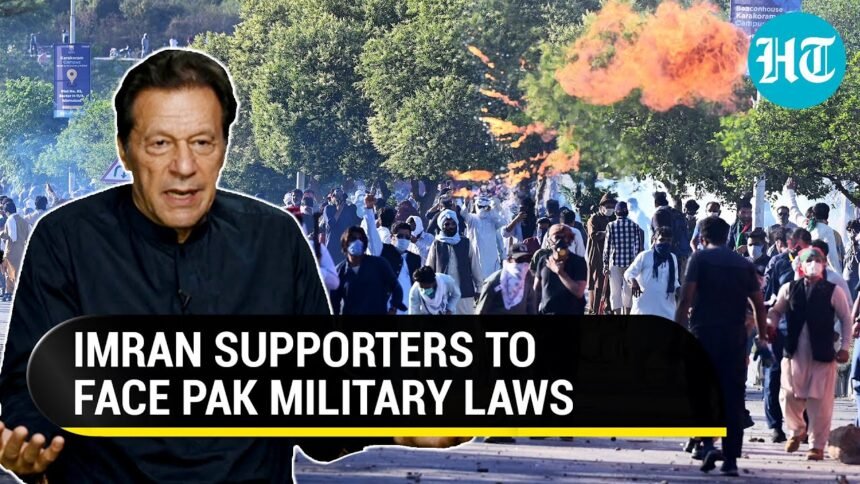Pakistan’s former prime minister, Imran Khan, has expressed his belief that the stage has been set for his “court martial” following the announcement by the country’s powerful army to try the “masterminds and planners” of the violence that occurred on May 9. This statement from Khan comes in response to Interior Minister Rana Sanaullah’s accusation that Khan was responsible for orchestrating the nationwide unrest that erupted after his arrest in a corruption case on the aforementioned date.
Imran Khan, who is the leader of the Pakistan Tehreek-e-Insaf (PTI) political party, made these comments while speaking to reporters after his appearance before the Islamabad High Court (IHC) on Thursday. Khan was present in court in connection with ten different cases, which comprised two ongoing petitions and eight new bail petitions. The 70-year-old politician acknowledged that he was fully aware that he would be facing trial in a military court.
The allegations against Imran Khan stem from the aftermath of his arrest on May 9, when violent protests broke out across the country. Supporters of the PTI took to the streets, leading to clashes with law enforcement agencies. In response, the army announced its intention to investigate and try the individuals believed to be responsible for planning and inciting the violence. The decision to refer these cases to military courts underscores the army’s resolve to ensure swift justice and maintain law and order.
The involvement of military courts in the trial of civilians has been a contentious issue in Pakistan. Military courts were initially established in 2015 as a temporary measure to deal with terrorism-related cases after a deadly attack on an army-run school in Peshawar. The courts were seen as a necessary response to the slow and ineffective civilian judicial system in dealing with terrorism cases. However, they have faced criticism from human rights organizations and legal experts for lacking transparency and due process.
Imran Khan’s acknowledgment of the likelihood of being tried in a military court reflects the tense relationship between the military establishment and the political leadership in Pakistan. Throughout his tenure as prime minister from 2018 to 2023, Khan faced challenges in balancing the power dynamics between the civilian government and the military. Critics often accused him of being too closely aligned with the military and relinquishing civilian authority.
The corruption case against Imran Khan, which led to his arrest on May 9, is just one of the legal challenges he faces. The PTI leader has been embroiled in multiple legal battles, including allegations of financial impropriety and mismanagement. These cases have been a source of political turmoil and have fueled speculation about the motivations behind Khan’s arrest.
As the legal proceedings against Imran Khan continue, the political landscape in Pakistan remains uncertain. The country has a history of political instability, and the confrontation between the civilian government and the military adds further complexity to the situation. The outcome of Khan’s trials and the broader implications for Pakistan’s democratic processes will be closely watched both domestically and internationally.




